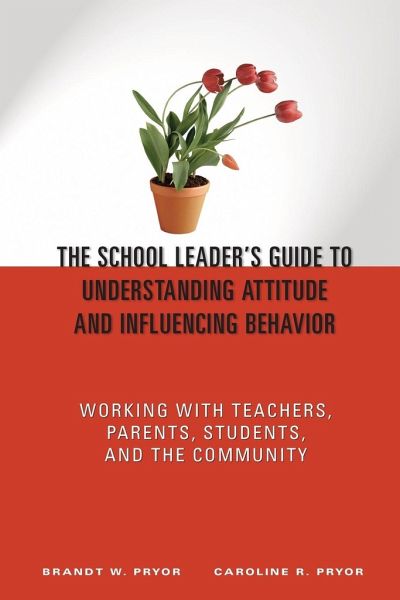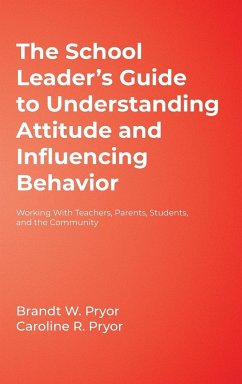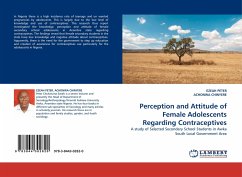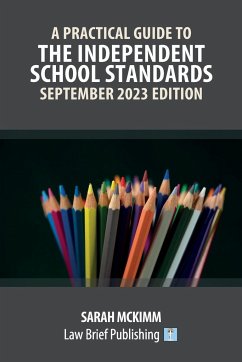
The School Leader's Guide to Understanding Attitude and Influencing Behavior
Working With Teachers, Parents, Students, and the Community
Versandkostenfrei!
Versandfertig in 1-2 Wochen

PAYBACK Punkte
14 °P sammeln!




Learn to understand and influence attitudes and behaviors of diverse constituencies. Includes attitude scales, steps in attitude-behavior study, data tables, and easily applied data analysis.
Brandt W. Pryor is Director of The Evaluation Group, College of Education, at Texas A&M University, College Station, where he now leads statewide studies of high school reform efforts. He is also an educational research consultant specializing in attitude and behavior studies. He has previously served as Associate Professor, Department of Educational Leadership, Lamar University, and Senior Research Associate in the College of Education at Arizona State University. He did his doctoral work at the University of Illinois, Urbana-Champaign, where he studied attitude theory and measurement with Martin Fishbein, the world's leading social psychologist. (Dr. Fishbein is now the Harry C. Coles, Jr., Distinguished Professor at the University of Pennsylvania.) His dissertation research, on which committee Fishbein served, was the first successful application of Fishbein's model to decision making about participation in voluntary educational programs. He later replicated that study in investigations of decision making by schoolteachers, prin-cipals, and others. His most recently completed attitude study investigated the participation of information scientists in professional development, and was published in the Journal of Education in Library and Information Science, 39, 118-133. He is currently studying decisions of teachers and administrators to use interactive video conferencing for pro-fessional development, and decisions of teachers to integrate technology into their instruction. He has spoken on attitudes and behavior since 1984, with high school students, community college teachers, as well as with public school and university teachers, researchers, and administrators. He has presented numerous scholarly papers concerning attitude theory, and has conducted his work-shop Have You Got "Attitude"?: Measuring, Understanding, and Changing Attitude and Behavior at state and national meetings since 1998.
Produktdetails
- Verlag: Corwin
- Seitenzahl: 162
- Erscheinungstermin: 17. November 2004
- Englisch
- Abmessung: 229mm x 152mm x 9mm
- Gewicht: 245g
- ISBN-13: 9781412904469
- ISBN-10: 1412904463
- Artikelnr.: 22101477
Herstellerkennzeichnung
Libri GmbH
Europaallee 1
36244 Bad Hersfeld
gpsr@libri.de
Für dieses Produkt wurde noch keine Bewertung abgegeben. Wir würden uns sehr freuen, wenn du die erste Bewertung schreibst!
Eine Bewertung schreiben
Eine Bewertung schreiben
Andere Kunden interessierten sich für













